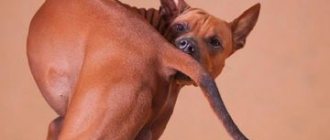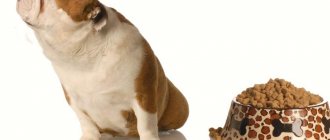Content
1. The dog asks to go outside too often 2. Congenital anomalies of the ureter and urethra 3. Closure of the urethra in dogs 4. Injuries leading to big problems 5. After spaying or neutering surgery 6. Instead of a conclusion
Owners often have difficulty tolerating puppies, wiping up drops of urine left behind due to a lack of understanding of the exact location or boundless joy. But it can also manifest itself in adulthood due to numerous health problems. The dog understands perfectly well that this is unpleasant for a person, but it cannot do anything about this condition. The animal is unable to control the bladder sphincter. Improper urination also means excessively frequent urge. The owner cannot walk the pet endlessly on the street, so you need to look for a way out of the situation, closely engage in treatment and eliminate the generating factor. The severity of the problem can range from the common cold to fatal diseases
If the process is difficult
This is the opposite situation, but usually it is caused by mechanical obstruction due to accumulated stones, general relaxation, and clogged ureters. In males, these are usually problems with the prostate gland. If a dog falls from a height, collides with a car, or comes under any other blow, then any of the urinary tracts can close, as evidenced by numerous swelling. If the injury was too severe, an aneurysm or even rupture of the bladder may occur.
Variant of the norm
The normal variant includes situations that do not require therapeutic measures. In some cases, the deviation can be corrected in other ways. There are three types of reasons why frequent urination occurs, related to the normal variant:
- natural;
- behavioral;
- age.
Natural causes
Natural reasons why a dog feels the urge very often can accompany both controlled and uncontrolled urinary incontinence. They are as follows:
- Severe stress that a dog receives as a result of excitement, fear, anxiety. To help an animal, you need to calm it down, create a friendly environment, and inject a sedative.
- Natural uncleanliness. The cause of incontinence can be poor upbringing, when the dog is not instilled with a conditioned reflex that it should urinate only on the street.
Behavioral reasons
If a dog pees often, then the causes of incontinence may be some features of the dog's behavior:
- The pet urinates to indicate its obedience to its owner or a stronger opponent. In such cases, she may fall on her back or sit on her paws. The owner needs to notice what exactly provokes the release of urine (eye contact, stern tone) and try to eliminate this factor.
- Marking the boundaries of your territory by leaving marks. In this case, the problem can only be solved by sterilization or castration of the animal.
- A dog may urinate in the house to spite its owner when he is dissatisfied or annoyed with something (jealousy, desire to avenge punishment, desire to attract attention, and so on). The owner needs to try to restore mutual understanding with his pet.
Typically, in the case of behavioral features, urine output is controlled by the dog.
Age reasons
Frequent urination in your dog may also be due to age-related reasons:
- Incontinence in an older dog. In older age, muscles gradually lose tone, the sphincter weakens and therefore involuntary urine leakage may occur. Correction of this disorder occurs through medication.
- Frequent urination in young females during estrus. Dogs that have not yet given birth experience quite severe pain at this time. To alleviate their condition, they are forced to empty their bladder frequently. To solve the problem, you need to walk the dog more often during such periods.
- Another reason for urinary incontinence in young bitches is the late formation of the hormonal system. Provoking factors can be different - lack of vitamins, poor nutrition, family history. Symptoms usually disappear after the first pregnancy.
The dog asks to go outside too often
There are many problems leading to this problem. Separately, it is worth highlighting a nervous breakdown in an animal. Dogs are not as fearless as is commonly believed. They have their own fears, because humans are much larger in size. There is no need to use physical violence when raising children; it is better to hire a specialized specialist. Involuntary urination can happen due to constant stress. The consequences of these nervous breakdowns can only be cured with love and understanding, and rehabilitation takes up to 1-2 years. Let's look at the main reasons for frequent and improper urination in dogs:
Common reasons
A common pathology in dogs is inflammation of the bladder. More often, pathology is observed in females. To recognize the disorder, the veterinarian will recommend taking a urine sample for a general analysis. Bacteriological culture will be required to determine the flora and its sensitivity to antibacterial drugs. Based on the test results, the doctor will select the appropriate course of antibiotics for your pet.
Typically, the course of therapy lasts two weeks. Then a control examination of the animal is carried out. The symptom of night urination disappears within a couple of days after starting treatment with antibacterial drugs. The course of treatment will need to be completed. Termination is fraught with the development of serious complications.
Polydipsia is a pathological thirst in an animal, causing increased urine output. Constant unquenchable thirst is considered a symptom of a number of serious endocrinological diseases. To determine the diagnosis, the doctor will perform several functional tests.
Congenital anomalies of the ureter and urethra
The main symptoms are fluid leakage immediately after birth, which occurs involuntarily. This process occurs around the clock, so soon an infection and many small ulcers form around the genitals.
This is a common problem in puppies, breeds bred with a mixture of related ties. In most cases, this is due to the so-called through structure. The bladder does not participate in accumulation, so the sphincter does not work, although it is present in the body. The animal can only squeeze it a little by force of will, sending a signal from the brain. This will reduce the flow, but will not fix the problem. Constant tension is very tiring, and the solution to the problem is only possible through surgery.
Urethral closure in dogs
The concept of this problem itself is very vague; it is only the cumulative result of numerous acquired and congenital deficiencies. The bladder sphincter begins to work incorrectly. Sometimes the reason for this is age, after about 8-9 years. Neutered females are much more susceptible to this. Usually the doctor prescribes a hormonal drug for the rest of your life. This case is characterized by the following symptoms:
- Urine leaks directly during sleep or during prolonged rest. The tone of the organs of the genitourinary system is lost, which leads to leaks.
- Puddles of different sizes appear on the floor, although the animal has not done this before.
- Complete emptying is possible at any time. At the same time, the animal looks very guilty.
- If your dog is constantly licking his genitals in an attempt to clean himself. Clean breeds are especially prone to this.
- An unpleasant constant odor appears, the fur on the belly begins to roll, and wounds and irritation appear around the urethra.
Basic treatment recommendations
Treatment should begin first by identifying the problem (drinking a lot of water, whining, blood in the urine, etc.).
If the pathology was caused by disturbances in the contractility of the sphincter, hormonal drugs should be used. A similar problem occurs quite often in spayed or neutered pets. It is associated with a lack of hormones.
If there are other problems, medications that are part of the group of tricyclic antidepressants may be effective. They are aimed at relaxing the bladder muscles. However, this also causes the sphincter to contract. This is exactly what is required.
The above remedies have a potent effect. Side effects often occur after taking them. It is recommended to use after consultation with a doctor. It is he who must choose the exact dosage.
If a puppy pees
If a small puppy urinates frequently, know that he will learn to control this process when he is 3-4 months old. The period will depend on how correctly the owner is able to explain what the puppy should do. We need to suggest where he should relieve himself.
It should be understood that it is extremely rare for a puppy to start urinating just like that. In many situations, this is accompanied by the presence of congenital pathologies. And the puppy will be able to return to normal life only after surgical intervention.
After spay or neuter surgery
The sphincter directly depends on the amount of hormones released into the blood. If you remove the gonads, disrupting this clear balance, you can get big problems. Veterinarians must warn the owner about this before surgery. For large breeds, the probability of trouble occurring is close to 8-15%, and for small breeds it is about 5%.
There is also a predisposition by breed. Lapdogs, Dobermans, setters, and almost the entire group of schnauzers are highly likely to urinate involuntarily after surgical deprivation of reproductive function. It is impossible to restore all this back. Even hormonal therapy may not give the expected effect due to damaged nerve endings.
Urolithiasis disease
The appearance of stones disrupts the urination pattern and the entire process as a whole. Stones are formed due to health problems, poor diet or dangerous water composition. The stone simply blocks the path of urine, causing dysfunction of the entire system as a whole. The size of these formations can be reduced using ultrasonic crushing or special preparations. If the size is particularly large, only surgical intervention and removal of the foreign body will help.
Cystitis and prostatitis
The first disease is more common in females, while males often suffer from problems with the prostate gland. The entire series of ailments is associated with infections and colds. The most common causes of their occurrence are the following factors:
Sexual relations with stray relatives due to the owner’s oversight can lead to numerous sexually transmitted diseases. Pets living in kennels may develop cystitis and prostatitis during the cold season. This also affects animals that constantly lie on their stomachs and on concrete. You can catch it when swimming in cold water, as well as when walking in the rain and snow. The infectious course can be provoked by concomitant diseases. Viruses, bacteria and fungi enter the genitourinary system from other organs.
The prescribed treatment usually consists of intensive therapy with antibiotics and antibacterial drugs. The prognosis is often positive if everything does not become chronic due to the owner’s oversight.
How to distinguish normality from pathology
Bedwetting has various causes. A “psychological problem” or the result of an existing inflammatory disease of the urinary system is likely.
To determine the exact etiology of bedwetting, your veterinarian will recommend a series of tests and tests. Research will reveal the true nature of your pet’s difficulty urinating and select adequate therapy.
First of all, the doctor will prescribe an ultrasound examination of the dog’s kidneys. This type of diagnosis will help identify the presence of inflammatory kidney diseases or pathology of organ formation. Perhaps it will determine the presence of a neoplasm in the pet.
Urine tests are required, which do not give such a clear picture, but allow one to assess the correct functioning of the kidneys. Using urine tests, it is possible to detect the presence of an infectious process in the urinary tract and kidneys, which cannot be determined by ultrasound.
In addition to the urological examination, it is necessary to evaluate the neurological status of the animal.
Bedwetting is often caused by diseases: cystitis, urolithiasis, diabetes mellitus, malignant neoplasms and benign tissue growths, inflammatory processes in the pelvic organs.











